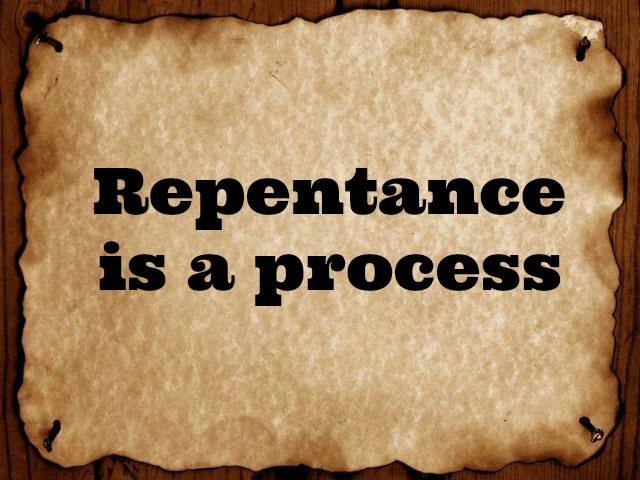Question
Dear Gramps,
I just have a question about the repentance process. So, we sin everyday, all the time. We are supposed to repent when we sin, but until we do we remain unforgiven. So, do we just hope that we die when we are at the peak of the repentance cycle? Is it possible to be justified in the whole cycle instead of waiting to the end to get complete forgiveness? And is the sacrament really necessary to gain forgiveness of sin?
James
Answer
Dear James,
It would be interesting to hear your definition repentance. Repentance is NOT confessing what you have done, although confession is a part of true repentance. Repentance is NOT refraining from doing something wrong. There is no cycle of repentance. True, when we do fully and completely repent it is possible to fall back into wicked ways, and the process would have to be carried out again. But this is no cyclical thing, and the thought of its possibility actually prevents true repentance from occurring.
Let me see if I can walk you through the repentance process. First of all we must recognize that what we are doing is against the laws of God. Next we must have a deep and abiding desire to eliminate that thing from our character. That is not easy. To say “I’m sorry,” is certainly not enough. Our sorrow for the sin must be so deep that the sin becomes truly repulsive to us. When we can feel revulsion for the kind of thing that we had been doing, and eliminate it from our very character so that it is no longer a part of us; then when we seek to restore to any injured party any damage that we have done, We must confess our sin to the injured party and ask for forgiveness from that person. If it is a serious sin, when we have met with the bishop of our Ward, who is the Lord’s representative to us, and confess to him, we may feel that we have repented and may expect the Lord’s forgiveness. Now, that process is NOT cyclical! Repentance is not confined to actions that we do or that we cease from doing, but it involves a change of heart, a change of character, so that we are not the same person that we were before. The Lord has said—
Behold, he who has repented of his sins, the same is forgiven, and I, the Lord, remember them no more.
By this ye may know if a man repenteth of his sins–behold, he will confess them and forsake them (D&C 58:42-43).
The Lord’s words on how to repent are to confess the sin and to forsake it. What does forsake mean? Webster’s dictionary gives this definition, “to renounce or turn away from entirely.” The key word in that definition is entirely. If we have any concept of a cyclical repentance, that certainly does not involve the concept of ‘entirely’. Again, the Lord has said—
Go your ways and sin no more; but unto that soul who sinneth shall the former sins return, saith the Lord your God.(D&C 82:7)
You cannot just repeatedly wipe the slate clean and think that you have been forgiven. But if one returns to former sinful ways the Lord will remember no more the good that the person has done, but he will remember all his sins. Here’s the story: the Lord judges us as we are–in our hearts, in our character, not as we were—
The LORD seeth not as man seeth; for man looketh on the outward appearance, but the LORD looketh on the heart (1 Samuel 16:7).
So, if we have truly repented, the Lord will remember our sins no more because they are not a part of us, but if we return to our sins, the Lord will not remember the righteous things that we have done because they are no longer part of us.
And by the way, partaking of the sacrament has nothing to do with the forgiveness of sin.
Gramps







